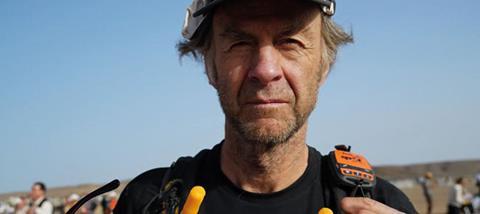Sam Hailes speaks to the world’s greatest living explorer about his record-breaking expeditions and his faith

To describe 71-year-old Sir Ranulph Fiennes as tough would be a colossal understatement. Born in Windsor and raised in South Africa, the explorer has traversed earth’s hottest deserts (50C) and frozen poles (-70C). His perseverance in the face of fear has resulted in many record-breaking firsts.
He was the first to reach both Poles by surface means, the first to cross the Antarctic continent unassisted and the first to circumnavigate the world along its polar axis. In 2003, just months after surviving a heart attack, a three-day coma and a double bypass, he became the first person to run seven marathons in seven consecutive days on all seven continents.
After one expedition to the North Pole, Sir Ranulph returned to the UK with badly frostbitten fingers. The doctors said they couldn’t amputate for another five months, so the explorer took matters into his own hands and bought a Black & Decker. It took five days to complete the DIY amputation, Sir Ranulph says in his typical matter-of-fact style. It’s almost as if he wonders what all the fuss is about.
During the first crossing of Antarctica – on Sundays we would have a church service in the tent
During our conversation Sir Ranulph displays the qualities that have no doubt seen him through the toughest of times. He’s thoughtful, careful and precise. But he’s rarely introspective – preferring to talk about what he’s done, rather than why he did it.
Many of his contemporaries view faith as a private matter, but Sir Ranulph is comfortable in talking about the ‘standard Protestant beliefs’ that have seen him through life. Earlier this year at Cheltenham Literature Festival he even suggested Christians make the best explorers; but I was amused to discover that this intrepid explorer is himself scared of heights.
You grew up in South Africa. Was this also where you first found faith?
My mum brought me up as a normal, shall we say, Protestant. But to me there wasn’t any difference between Protestant and Catholic, because us Protestants every Sunday said, ‘I believe in the holy catholic Church’ and the ‘virgin Mary’. You’re either a Christian or you’re not. When we came to England we went to the local church and didn’t mind what it was.
Has that faith been strong throughout your life?
Yes; I was brought up believing in the standard Protestant beliefs and I still do.
Every now and then there’s been some sort of faint blip. When I had a heart attack about ten years ago, I was on a drip and out of it. They tried to start my heart ticking again. On the 13th attempt it restarted. When I woke up my wife was in the room and said, ‘You had a heart attack four days ago.’ But to this day I don’t remember anything about it.
If, hypothetically, they had not managed to start [my heart] then my experience of those four days would have carried on ad infinitum. Therefore as far as I was concerned it was death. So, I asked our local priest, ‘Why did I not have anything? No angels. Nothing. Just a good sleep.’ [I wondered] if maybe death actually was just a good sleep. He said he would let me know. About a week later he said, ‘I’ve been thinking about it and basically, Ranulph, you did not die properly.’
And you found that answer satisfying?
Well, because throughout my whole life I have had a belief in standard Christianity, and because I’m not a scientist like Mr Dawkins, I don’t deeply question things. I don’t bother about Stephen Hawking. I don’t go into it. As far as I’m concerned, I like the faith that I’ve been brought up with.
Does this belief help you carry on in difficult circumstances?
Yes, it definitely does. I’ve never had any religious feeling like there’s a third unseen person there [with me] like in some polar stories. During the First World War there was the Angel of Mons – some angel who was alongside the troops looking after you. Whether [those stories are] true or not, I haven’t had any experience of it.
When I’m doing an expedition, if we’re trying to break a world record, you’re not up against people so much as some sort of icy problem or the wrong time of year, or high altitude. Whatever the problem is – it is nature and not humans. And nature is not out to get you. You’ve got to realise this. God made the ice. God made you, and the word ‘luck’ is a very important thing that can go either way.
Which joys or challenges in your career particularly stand out?
I’m pretty proud of the fact I was lucky enough to be very happily married for 38 years before my late wife died. When I came from Africa to England she lived next door. She was 9 and I was 12. I didn’t marry her until I was 24. I’m proud that despite the age of divorce, we had an incredibly happy and successful marriage for all that time.
And then luck came again when a year after my wife died, I married again, another lovely lady [Louise Millington] and we’re blessed with a daughter.
In terms of expeditions, one of them took 26 years searching for a lost city in Arabia. We had eight major Land Rover expeditions into the greatest desert in the world before we actually found it: The Koranic city of Ubar. Today it’s the biggest excavation work in Arabia.
ACHIEVEMENTS
First to reach both Poles (with Charles Burton)
First to cross Antarctic and Arctic Ocean (with Charles Burton)
First and only person ever to circumnavigate the world along its polar axis (with Charles Burton)
Led the first hovercraft expedition up the Nile, the longest river in the world, in 1968–69
Achieved world record for unsupported northerly polar travel in 1990
Discovered the lost city of Ubar on the Yemeni border in 1992
In 1992–93 completed the longest unsupported polar journey in history – crossing the Antarctic continent (with Mike Stroud)
In 2003, months after a heart attack, three-day coma and double bypass, Ranulph Fiennes (with Mike Stroud) achieved the first 7x7x7 (seven marathons in seven consecutive days on all seven continents)
Successfully summited Everest in May 2009 raising over £6.2m for Marie Curie and becoming the oldest Briton ever to summit
In 1979 you began the Transglobe Expedition where you and Charlie Burton circumnavigated the world along its polar axis. HRH Prince Charles called it ‘mad but marvellous’. What happened?
The whole journey is about 52,000 miles including the oceans that get in the way. We started at Greenwich which is zero longitude and we followed more or less that line of longitude to the South Pole, crossing Antarctica. Then we eventually reached the North Pole and got cut off. We found a bit of ice that was 8ft thick on the drill and put a tent up and floated from the North Pole towards Siberia.
Three months later we came out using a canoe with skis and met up with our 40-year-old expedition ship, organised by our friend Anton Bowring somewhere north of Greenland. Then they got us back down to Greenwich about three years and a couple of days after we set out.
Has anyone repeated that journey?
As yet, nobody has repeated it. Nobody did it before. Sadly Charlie is dead, but we are the only human beings in history to have gone vertically around [the] earth’s surface.
And I hear you led weekly church services in the Antarctic during the trip?
Oliver Shepard and Charlie Burton were the two we eventually selected out of 800 applicants to be with me all the way round the world. For many, many days and nights we were in the middle of nowhere during the first crossing of Antarctica – on Sundays we would have a church service in the tent.
But because we don’t carry anything like a toothbrush or a Bible – that’s heavy – we didn’t have any hymn books. The only thing we discovered we all knew was the first verse of Jerusalem. So every single Sunday that was the only hymn that came up. Nobody would have known [we were doing church] because there was nobody within 1,000 miles. Oli Shepard still calls me ‘Padre’ as my nickname. I was just doing the prayers.
Have you seen the beauty of God’s creation in places that most people never manage to visit?
Anybody who has a belief and has the luck of travelling to beautiful places would answer your question by saying yes. The same is true of me. But trying to put that into the expedition context doesn’t work in my case.
Antarctica’s icy area, 2,000 miles across, is a continent bigger than China and India, but with nothing else on it. No Tescos. We knew that what was going to stop us breaking the record and doing the first unsupported crossing [was] something like a crevasse. A crevasse has got a blue shade to it, because of the hole. But where there aren’t any crevasses it continues to be white.
I like the faith that I’ve been brought up with
So if the whole 2,000 miles across was white and therefore totally uninteresting in terms of scenery, we would be happy! We were not at all pleased when we saw ‘beauty’… What we’re looking for is no beauty whatsoever. Total whiteness for 2,000 miles – then we might break the record.
Adventurers like Bear Grylls are very popular today. What do you make of someone like him?
We make a very fine distinction between the word ‘adventurer’ and the word ‘expedition leader’. I would hate to be called an adventurer. Our expeditions are out to break world records. We mapped unknown areas of earth, like 900 miles of Antarctica in 1980. That’s called exploring. We raise money for charity. To date the expeditions have raised £18.2m for mostly UK charities.
We take scientists with us very often who produce scientific information of many different varieties over the years. Climbing Everest or being second to the South Pole are great expeditions, but they’re not exploring.
For us to comment on other expedition people is not something we like doing. However, you brought in a specific name – Bear Grylls. He’s a wonderful Christian; a great chief Boy Scout. He had a problem some years ago with the newspapers trying to say he…was not the youngest Brit to climb Everest. He asked me if I could tell the papers the truth, which I then did, which was that the other claimant was indeed younger than Bear, but he was an Australian citizen. So yes, Bear was the youngest.
And you have a record on Everest as well, don’t you?
Yes, I was the oldest Brit and the first OAP [to climb Everest].
There’s a hell of a lot for humans to explore
You were hoping climbing Everest would help you get over your fear of heights. Did it work?
Yes, I did hope that. It didn’t work. I don’t like any sort of vertical stuff. When at home in the autumn the gutters get blocked up with leaves, I will hold the bottom of the ladder and let my wife go up and clean the gutters.
Is there anywhere left to explore on earth?
About a year ago there was an interview with the headline ‘Fiennes says there’s nowhere left to explore’, which was a total lie. I never said anything of the sort.
Everywhere is now mapped from satellites. So there’s no need to do what we call exploring – producing information that is not known previously. But there are still huge areas of the earth under the oceans which aren’t explored. There’s almost certainly many types of live creatures down there which we don’t even know about yet. In space…slowly but surely and very expensively, we will no doubt be able to explore more. There’s a hell of a lot for humans to explore yet.
Do you have a future expedition or next challenge planned?
We are working on something for next year which would be a world record. But there are other contenders from other countries who are in a position to break it before we would. So we don’t want to accelerate their activities by announcing it too soon.
Hear the interview in full on Premier Christian Radio, Sat 5th December at 4pm




































